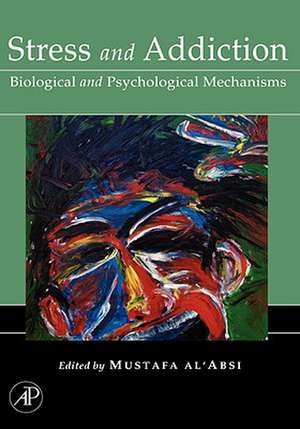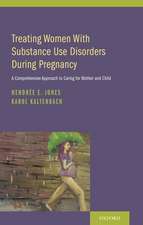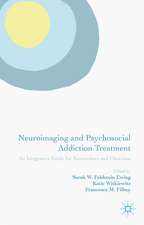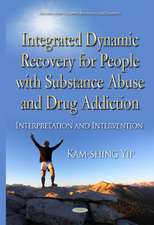Stress and Addiction: Biological and Psychological Mechanisms
Editat de Mustafa al'Absien Limba Engleză Hardback – 25 feb 2007
- Integrates theoretical and practical issues related to stress and addiction
- Includes case studies illustrating where an emotional state and addictive behavior represent a prominent feature of the clinical presentation
- Cross-disciplinary coverage with contributions by by scientists and practitioners from multiple fields, including psychology, neuroscience, neurobiology, and medicine
Preț: 579.41 lei
Preț vechi: 609.90 lei
-5% Nou
Puncte Express: 869
Preț estimativ în valută:
110.91€ • 120.51$ • 93.22£
110.91€ • 120.51$ • 93.22£
Carte tipărită la comandă
Preluare comenzi: 021 569.72.76
Specificații
ISBN-13: 9780123706324
ISBN-10: 0123706327
Pagini: 456
Ilustrații: Illustrated
Dimensiuni: 184 x 260 x 27 mm
Greutate: 1.04 kg
Editura: ELSEVIER SCIENCE
ISBN-10: 0123706327
Pagini: 456
Ilustrații: Illustrated
Dimensiuni: 184 x 260 x 27 mm
Greutate: 1.04 kg
Editura: ELSEVIER SCIENCE
Public țintă
Clinicians and researchers in neuroscience, neurobiology, neurology, psychology, and medicine.Cuprins
Foreword by George F. Koob
Section I. Neurobiology of Stress and Addiction.
Biological Bases of the Stress Response.
The Hypothalamic-Pituitary-Adrenal Axis and Addiction.
Dopaminergic Reward Pathways and Effects of Stress.
Endogenous Opiates, Addiction, and the Stress Response.
Early Life Stress and Vulnerability to Addiction.
Genetics, Stress and the Risk for Addiction .
Neurobiology of Stress and Risk for Relapse.
Section II. Psychosocial Processes Related to Stress and Addiction.
Negative Affect and Addiction.
Stress and Impulsive Behaviors.
Psychosocial Determinants of the Stress Response.
Individual Differences in Response to Stress and Risk for Addiction.
Addiction and Stress in Adolescents.
Section III. Clinical Implications: Assessment and Intervention.
The Assessment of Stress in Research and Clinical Settings.
Assessment of Addictions in Clinical and Research Settings.
Stress, Anxiety and Addiction: Intervention Strategies.
Posttraumatic Stress Disorder and Substance Use Disorders.
Novel Pharmacologic treatment of Stress and Addiction: The Role of CRF and Glucocorticoid Antagonists.
Future directions of research on stress and addictive behaviors.
Section I. Neurobiology of Stress and Addiction.
Biological Bases of the Stress Response.
The Hypothalamic-Pituitary-Adrenal Axis and Addiction.
Dopaminergic Reward Pathways and Effects of Stress.
Endogenous Opiates, Addiction, and the Stress Response.
Early Life Stress and Vulnerability to Addiction.
Genetics, Stress and the Risk for Addiction .
Neurobiology of Stress and Risk for Relapse.
Section II. Psychosocial Processes Related to Stress and Addiction.
Negative Affect and Addiction.
Stress and Impulsive Behaviors.
Psychosocial Determinants of the Stress Response.
Individual Differences in Response to Stress and Risk for Addiction.
Addiction and Stress in Adolescents.
Section III. Clinical Implications: Assessment and Intervention.
The Assessment of Stress in Research and Clinical Settings.
Assessment of Addictions in Clinical and Research Settings.
Stress, Anxiety and Addiction: Intervention Strategies.
Posttraumatic Stress Disorder and Substance Use Disorders.
Novel Pharmacologic treatment of Stress and Addiction: The Role of CRF and Glucocorticoid Antagonists.
Future directions of research on stress and addictive behaviors.
Recenzii
"In summary, Stress and Addiction: Biological and Psychological Mechanisms is a useful book that provides an overview of the research on stress and addiction in a concise format that motivated readers can use as a starting point to track down more in-depth information in diverse areas. It works best as a reference resource. The writers of the individual chapters are knowledgeable and present research findings clearly. ... The book provides a balanced view in terms of presenting conflicting research findings, and it discusses limitations of instruments and study designs. This book achieves its goal of bringing together biological and psychological findings on the overlap of stress and addiction." --Michael Weaver, Virginia Commonwealth University, in SRNT (Society for Research on Nicotine and Tobacco) Newsletter May / June 2007, Volume 13, Number 2







